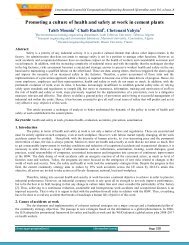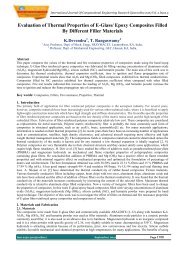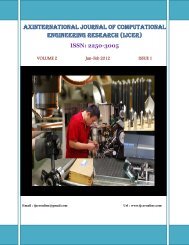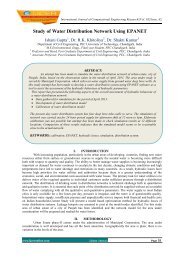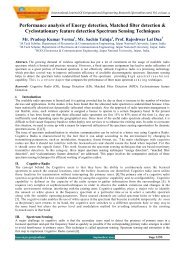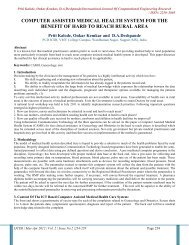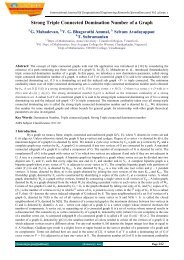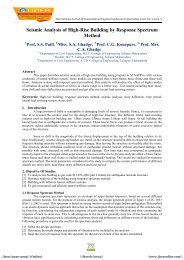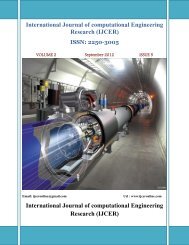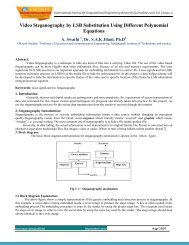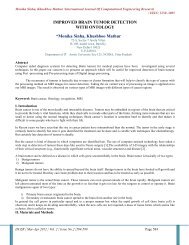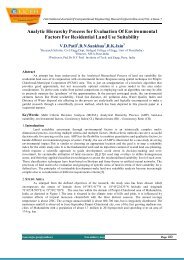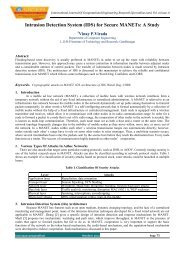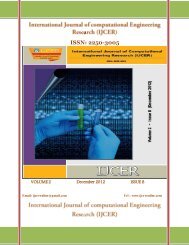- Page 1 and 2:
International Journal of computatio
- Page 3 and 4:
Meisam Mahdavi Qualification: Phd E
- Page 5 and 6:
12. 13. 14. 15. 16. 17. 18. 19. 20.
- Page 7 and 8:
15. 16. 17. 18. 19. 20. Traditional
- Page 9 and 10:
19. A Study on Security in Sensor N
- Page 11 and 12:
International Journal of Computatio
- Page 13 and 14:
Study Of The Energy Potential Of So
- Page 15 and 16:
Study Of The Energy Potential Of So
- Page 17 and 18:
Study Of The Energy Potential Of So
- Page 19 and 20:
Neural network approach to power sy
- Page 21 and 22:
Neural network approach to power sy
- Page 23 and 24:
Strength, Corrosion correlation of
- Page 25 and 26:
Strength, Corrosion correlation of
- Page 27 and 28:
Strength, Corrosion correlation of
- Page 29 and 30:
International Journal of Computatio
- Page 31 and 32: Mutual Funds and SEBI Regulations S
- Page 33 and 34: REFERENCES Mutual Funds and SEBI Re
- Page 35 and 36: Integral solution of the biquadrati
- Page 37 and 38: Integral solution of the biquadrati
- Page 39 and 40: Experimental Studies on Effect of C
- Page 41 and 42: Experimental Studies on Effect of C
- Page 43 and 44: Experimental Studies on Effect of C
- Page 45 and 46: Experimental Studies on Effect of C
- Page 47 and 48: Simulation studies on Deep Drawing
- Page 49 and 50: Simulation studies on Deep Drawing
- Page 51 and 52: Radial strain Radial Strain Hoop St
- Page 53 and 54: Simulation studies on Deep Drawing
- Page 55 and 56: Text Extraction in Video II. MAIN C
- Page 57 and 58: Text Extraction in Video good idea.
- Page 59 and 60: Text Extraction in Video Fig: 5.1 T
- Page 61 and 62: Improved Performance for “Color t
- Page 63 and 64: Improved Performance for “Color t
- Page 65 and 66: Improved Performance for “Color t
- Page 67 and 68: Chain code based handwritten cursiv
- Page 69 and 70: Chain code based handwritten cursiv
- Page 71 and 72: Strength of Ternary Blended Cement
- Page 73 and 74: Strength of Ternary Blended Cement
- Page 75 and 76: International Journal of Computatio
- Page 77 and 78: Ni-Based Cr Alloys and Grain Bounda
- Page 79 and 80: International Journal of Computatio
- Page 81: Comparative Study of Available Tech
- Page 85 and 86: Analyzing massive machine data main
- Page 87 and 88: Analyzing massive machine data main
- Page 89 and 90: Implementation Of An Algorithmic To
- Page 91 and 92: Implementation Of An Algorithmic To
- Page 93 and 94: Implementation Of An Algorithmic To
- Page 95 and 96: Implementation Of An Algorithmic To
- Page 97 and 98: Model Order Reduction By Mixed... a
- Page 99 and 100: Amplitude The unit time step respon
- Page 101 and 102: Enterprise Management Information S
- Page 103 and 104: Enterprise Management Information S
- Page 105 and 106: A Novel Approach For Filtering Unre
- Page 107 and 108: A Novel Approach For Filtering Unre
- Page 109 and 110: Current Routing Strategies To Adapt
- Page 111 and 112: Energy Based Routing Protocol for W
- Page 113 and 114: Energy Based Routing Protocol for W
- Page 115 and 116: Cfd Analysis of Convergent- Diverge
- Page 117 and 118: Cfd Analysis of Convergent- Diverge
- Page 119 and 120: Cfd Analysis of Convergent- Diverge
- Page 121 and 122: Cfd Analysis of Convergent- Diverge
- Page 123 and 124: Cfd Analysis of Convergent- Diverge
- Page 125 and 126: Cfd Analysis of Convergent- Diverge
- Page 127 and 128: Observation on the Ternary Cubic Eq
- Page 129 and 130: (2) n n 3n n x (2 ,1) y(2 ,1) 3[
- Page 131 and 132: Observation on the Ternary Cubic Eq
- Page 133 and 134:
Integral Solutions of the Homogeneo
- Page 135 and 136:
Integral Solutions of the Homogeneo
- Page 137 and 138:
International Journal of Computatio
- Page 139 and 140:
International Journal of Computatio
- Page 141 and 142:
International Journal of Computatio
- Page 143 and 144:
International Journal of Computatio
- Page 145 and 146:
Dividing expression (a) by (b), P =
- Page 147 and 148:
Highly Efficient Motorized…. Torq
- Page 149 and 150:
Highly Efficient Motorized…. = =
- Page 151 and 152:
International Journal of Computatio
- Page 153 and 154:
A comparative study of Broadcasting
- Page 155 and 156:
A comparative study of Broadcasting
- Page 157 and 158:
Recommendation Systems: a review Co
- Page 159 and 160:
Recommendation Systems: a review 1.
- Page 161 and 162:
Recommendation Systems: a review V.
- Page 163 and 164:
Using Fast Fourier Extraction Metho
- Page 165 and 166:
Using Fast Fourier Extraction Metho
- Page 167 and 168:
Using Fast Fourier Extraction Metho
- Page 169 and 170:
International Journal of Computatio
- Page 171 and 172:
P= Number of Poles. d) Fourth Objec
- Page 173 and 174:
Using Genetic Algorithm Minimizing
- Page 175 and 176:
Using Genetic Algorithm Minimizing
- Page 177 and 178:
Literature review: Iris Segmentatio
- Page 179 and 180:
Literature review: Iris Segmentatio
- Page 181 and 182:
Effects of Agreement on Trims on In
- Page 183 and 184:
Effects of Agreement on Trims on In
- Page 185 and 186:
Effects of Agreement on Trims on In
- Page 187 and 188:
A Novel Approach to Mine Frequent I
- Page 189 and 190:
A Novel Approach to Mine Frequent I
- Page 191 and 192:
Time(ms) A Novel Approach to Mine F
- Page 193 and 194:
International Journal of Computatio
- Page 195 and 196:
Similarly, reactions at bearings (1
- Page 197 and 198:
Modeling and Analysis of the Cranks
- Page 199 and 200:
International Journal of Computatio
- Page 201 and 202:
Efficient Model for OFDM based IEEE
- Page 203 and 204:
Efficient Model for OFDM based IEEE
- Page 205 and 206:
Efficient Model for OFDM based IEEE
- Page 207 and 208:
International Journal of Computatio
- Page 209 and 210:
Traditional Uses Of Plants By The T
- Page 211 and 212:
Traditional Uses Of Plants By The T
- Page 213 and 214:
International Journal of Computatio
- Page 215 and 216:
Content Based Video Retrieval Using
- Page 217 and 218:
Content Based Video Retrieval Using
- Page 219 and 220:
Effective and secure content retrie
- Page 221 and 222:
Effective and secure content retrie
- Page 223 and 224:
Effective and secure content retrie
- Page 225 and 226:
speed rad/sec Master-Slave Speed Co
- Page 227 and 228:
speed rad/sec speed rad/sec speed r
- Page 229 and 230:
Cd-Hmm For Normal Sinus Rhythm 1 0
- Page 231 and 232:
Cd-Hmm For Normal Sinus Rhythm III.
- Page 233 and 234:
Develop A Electricity Utility… In
- Page 235 and 236:
Develop A Electricity Utility… Ex
- Page 237 and 238:
Develop A Electricity Utility… Fi
- Page 239 and 240:
International Journal of Computatio
- Page 241 and 242:
Implementing CURE to Address Scalab
- Page 243 and 244:
Implementing CURE to Address Scalab
- Page 245 and 246:
Implementing CURE to Address Scalab
- Page 247 and 248:
Design of Uniform Fiber Bragg grati
- Page 249 and 250:
Design of Uniform Fiber Bragg grati
- Page 251 and 252:
Reflectivity (%) Reflectivity (%) D
- Page 253 and 254:
Effect of Alkaline Activator on Wor
- Page 255 and 256:
comp. strengthin Mpa Comp. strength
- Page 257 and 258:
Effect of Alkaline Activator on Wor
- Page 259 and 260:
Priority Based Service Composition
- Page 261 and 262:
Priority Based Service Composition
- Page 263 and 264:
International Journal of Computatio
- Page 265 and 266:
Formation of pseudo-random sequence
- Page 267 and 268:
Formation of pseudo-random sequence
- Page 269 and 270:
Formation of pseudo-random sequence
- Page 271 and 272:
International Journal of Computatio
- Page 273 and 274:
Block mathematical coding method of
- Page 275 and 276:
Block mathematical coding method of
- Page 277 and 278:
International Journal of Computatio
- Page 279 and 280:
Fast Encryption Algorithm for Strea
- Page 281 and 282:
International Journal of Computatio
- Page 283 and 284:
Area and Speed wise superior Vedic
- Page 285 and 286:
Area and Speed wise superior Vedic
- Page 287 and 288:
International Journal of Computatio
- Page 289 and 290:
Effect of nano-silica on properties
- Page 291 and 292:
Effect of nano-silica on properties
- Page 293 and 294:
International Journal of Computatio
- Page 295 and 296:
Load forecasting for practical powe
- Page 297 and 298:
In scalar notation, the fitted mode
- Page 299 and 300:
Mape load in MW Load forecasting fo
- Page 301 and 302:
Load forecasting for practical powe
- Page 303 and 304:
International Journal of Computatio
- Page 305 and 306:
Efirstaid medical services for acci
- Page 307 and 308:
International Journal of Computatio
- Page 309 and 310:
Comparative study of capacitance of
- Page 311 and 312:
Comparative study of capacitance of
- Page 313 and 314:
Increasing the Comprehensibility of
- Page 315 and 316:
Increasing the Comprehensibility of
- Page 317 and 318:
International Journal of Computatio
- Page 319 and 320:
Smart Message Communication for War
- Page 321 and 322:
International Journal of Computatio
- Page 323 and 324:
In Mobile Ad hoc Networks: Issues a
- Page 325 and 326:
In Mobile Ad hoc Networks: Issues a
- Page 327 and 328:
International Journal of Computatio
- Page 329 and 330:
Comparison Of UPS Inverter Using PI
- Page 331 and 332:
Comparison Of UPS Inverter Using PI
- Page 333 and 334:
Comparison Of UPS Inverter Using PI
- Page 335 and 336:
International Journal of Computatio
- Page 337 and 338:
Ageing Behaviour of Epdm/Pvc Compos
- Page 339 and 340:
Ageing Behaviour of Epdm/Pvc Compos
- Page 341 and 342:
International Journal of Computatio
- Page 343 and 344:
On Α Locally Finite In Ditopologic
- Page 345 and 346:
International Journal of Computatio
- Page 347 and 348:
A Study On Security In Sensor… IE
- Page 349 and 350:
A Study On Security In Sensor… Th
- Page 351 and 352:
International Journal of Computatio
- Page 353 and 354:
Design and Simulation of Nonisolate
- Page 355 and 356:
Design and Simulation of Nonisolate
- Page 357 and 358:
Design and Simulation of Nonisolate
- Page 359 and 360:
Design and Simulation of Nonisolate
- Page 361 and 362:
Evaluating The Privacy Measure Of T
- Page 363 and 364:
Evaluating The Privacy Measure Of T
- Page 365 and 366:
Work Done On Avoidance… n New RA
- Page 367 and 368:
Work Done On Avoidance… Probabili
- Page 369 and 370:
Data Aggregation Protocols In Wirel
- Page 371 and 372:
Data Aggregation Protocols In Wirel
- Page 373 and 374:
Data Aggregation Protocols In Wirel
- Page 375 and 376:
International Journal of Computatio
- Page 377 and 378:
Development Of Virtual Backbone…
- Page 379 and 380:
Development Of Virtual Backbone…
- Page 381 and 382:
International Journal of Computatio
- Page 383 and 384:
Domain Driven Data Mining: An… To
- Page 385 and 386:
Domain Driven Data Mining: An… X
- Page 387 and 388:
Domain Driven Data Mining: An… [5
- Page 389 and 390:
The Rhythm Of Omission Of Articles
- Page 391 and 392:
All of them are from Rural backgrou
- Page 393 and 394:
The Rhythm Of Omission Of Articles
- Page 395 and 396:
The Rhythm Of Omission Of Articles
- Page 397 and 398:
The Rhythm Of Omission Of Articles
- Page 399 and 400:
The Rhythm Of Omission Of Articles
- Page 401 and 402:
Image Segmentation using RGB… gra
- Page 403 and 404:
Image Segmentation using RGB… and
- Page 405 and 406:
Image Segmentation using RGB… [8]
- Page 407 and 408:
Performance Comparison Of Rayleigh
- Page 409 and 410:
Performance Comparison Of Rayleigh
- Page 411 and 412:
Performance Comparison Of Rayleigh
- Page 413 and 414:
International Journal of Computatio
- Page 415 and 416:
Walking the talk in training future
- Page 417 and 418:
Walking the talk in training future
- Page 419 and 420:
Walking the talk in training future
- Page 421 and 422:
International Journal of Computatio
- Page 423 and 424:
Experimental Investigation Of Multi
- Page 425 and 426:
Experimental Investigation Of Multi
- Page 427 and 428:
Experimental Investigation Of Multi
- Page 429 and 430:
A Firm Retrieval Of Software… Cla
- Page 431 and 432:
A Firm Retrieval Of Software… hop
- Page 433 and 434:
A Firm Retrieval Of Software… tab
- Page 435 and 436:
2.1. Introduction to Service Matchi
- Page 437 and 438:
Reduced Complexity Of Service Match
- Page 439 and 440:
International Journal of Computatio
- Page 441 and 442:
Pulsed Electrodeposition Of Nano…
- Page 443 and 444:
Pulsed Electrodeposition Of Nano…



